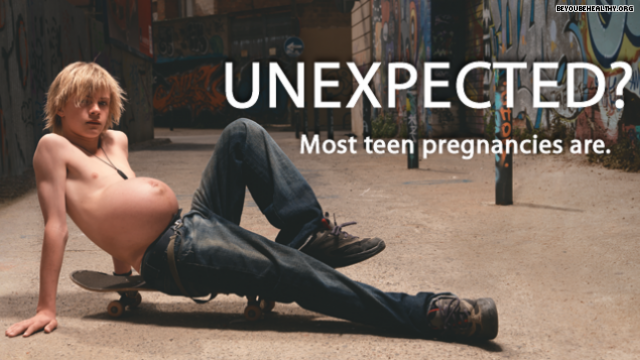“pregnant” boys: chicago’s controversial new ad campaign

A new public awareness campaign designed to lower teen pregnancy rates has sparked public debate after billboards were recently rolled out across Chicago. The posters, aimed at teenagers and their parents, feature Photoshopped images of topless, heavily pregnant teen boys with the tagline: ‘Unexpected? Most teen pregnancies are’.
The billboards and posters have been concentrated near highschools and in areas with elevated rates of unplanned teen pregnancies, as well as at bus shelters and on public transport. Although Chicago’s teen pregnancy figures have declined by 33% in recent years, they are still well above the national average.
According to the Chicago Department of Public Health, the campaign is designed to challenge established gender roles related to teen pregnancy and parenthood by emphasising shared responsibility. Given the ease and regularity with which society tends to demonise and/or patronise young mothers, (they’re either sluts who deserve to be ridiculed, or poor young girls who have ruined their lives forever), reminding people that it takes two to tango (or make a baby) is important. By focusing on the responsibility of young boys and the importance of condoms, the ads manage, by and large, to avoid shaming young parents, relying instead on the shock of seeing young boys with pregnant bellies.
The Chicago campaign at least compares favourably in this respect to a similar effort in Milwaukee, which uses many of the same images but with a considerably more shame-laden tagline: ‘It shouldn’t be any less disturbing when it’s a girl’. A recent teen pregnancy prevention campaign in New York was even more problematic, utilising an image of a distressed toddler and text that read: ‘I’m twice as likely not to graduate high school because you had me as a teen’.
At least one Facebook user criticised the campaign employed in Chicago for shaming young transgender people who fall pregnant. Although I don’t feel qualified to address this point in the fullness it deserves, there certainly appear to be some problems involved in using these images in order to shock people.
Whilst it may not be a perfect response to high rates of unplanned teen pregnancies (each image includes a helpful and realistic suggestion that abstinence will do the trick), the decision to place greater emphasis on the responsibility of teenage boys is a positive step and hopefully the campaign makes some small difference in the representation of young mothers.

